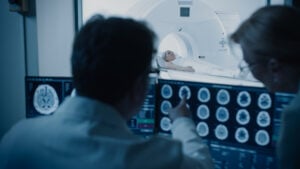Cataract surgery is amongst the most common surgical procedures performed in the UK, representing six per cent of all operations annually. That’s equivalent to some 300,000 cataract operations in England alone – around 50 per cent of which are performed privately.
Cataract surgery is a type of eye surgery to remove a cataract (cloudy lens). The procedure is reported to have a 90 per cent success rate, which is improvement in vision. The surgery clears the trademark ‘cloudiness’ that cataracts cause in the eye by replacing the natural lens with an artificial lens. This can also improve other underlying vision problems, including astigmatism.
Approximately one-third of the population aged 65 and over has had at least one cataract removed. It is predicted that by 2026 the number of patients in this age group requiring cataract surgery will have soared by 20 per cent.
Around 95 per cent of cataracts are age-related, with 40 per cent of patients having them in both eyes.
The increasing demand presents a considerable challenge to the UK’s public NHS, which already manages long waiting lists for surgery and other treatments, made worse by the pandemic.
Pre-pandemic, the waiting list for cataract surgery was three and a half months. It now stands at a minimum of nine months for first-time cataract surgery. The longest waiting time is 94 weeks at King’s College Hospital in London, while the shortest waiting time is ten weeks at Luton & Dunstable University Hospital, just 35 miles away.
During the height of the pandemic, around 8,000 cataract operations a week were cancelled. Together with the additional patients requiring a cataract operation each year, all those missed operations have expanded the waiting list to record numbers of at least 800,000 people.
Pre-cataract surgery
Before your surgery, the operation will be explained to you, including the option to use private care and the advantages of doing so. For example, more intraocular lens choices are available if you have the operation outside the NHS. There are two types of intraocular lenses surgeons use during cataract surgery – monofocal and multifocal or extended depth of focus (EDoF). The pros and cons of both should be explained to you and why a particular type is best for you.
Your ophthalmologist will advise you of the potential risks of cataract surgery, how long it should take for you to recover, and whether or not your eyesight will be good enough afterwards to go out without glasses.
During cataract surgery – which lasts around 40 minutes – you will receive a local anaesthetic, meaning you will be awake throughout the procedure. If you prefer, though, you can ask to be sedated. The cloudy lens is removed, and the artificial version is attached using a laser. This laser can also help with correcting any astigmatism you may have.
Post-cataract surgery
For most patients, it takes around a week after surgery before their eyesight feels ‘normal’ again, and sight should be significantly improved after six weeks. During this recovery period, it is important not to rub your eyes. It would be best if you did not read too much or stare at a computer screen for long periods as the eyes will need to rest as they acclimatise to the new lens.
Leading eye hospitals in the UK, Europe and USA
Moorfields Private Eye Hospital – London, UK
The UK government’s top official assessment body, the Care Quality Commission (CQC), rated Moorfield hospital’s surgical services as ‘outstanding.’ The hospital claims to provide “the most comprehensive range of ophthalmic services available in the UK.”
Consultant Retinal Surgeon Professor Bainbridge performed the world’s first gene therapy for genetic blindness and Europe’s first trial of embryonic stem cell transplantation. He has the Academy of Medical Sciences Award for Ophthalmology, Moorfields Research Medal and the US Foundation Fighting Blindness Board of Directors’ Award. In 2018 he received the Champalimaud Vision Award, one of the world’s most prestigious scientific prizes.
Manchester Royal Eye Hospital – Manchester, UK
This Manchester institution is a world-renowned eye hospital and has provided UK-wide eye care for more than 200 years. It has a dedicated centre for cataract care.
Consultant Ophthalmologist Professor Paul Bishop has published over 80 papers. He chairs grant-awarding panels for the Macular Society and RP Fighting Blindness (now Retina UK) and sits on the Fight for Sight grant panel. He is also a member of the Ophthalmic Advisory Panel for the Commission on Human Medicines.
Consultant Ophthalmic, Oculoplastic & Orbital Surgeon Saj Ataullah is a fellow of the Royal College of Ophthalmologists, a founder member of the British Oculoplastic Surgery Society (BOPSS) and a member of the American Academy of Ophthalmology. As a leading consultant in one of the largest teaching eye hospitals in Europe, Saj has trained eye surgeons from all around the world.
Eye Laser – Zurich, Switzerland
At this top Swiss eye centre, the examination and consultation are all carried out personally by the attending surgeon. They will then go on to perform the operation, giving the patient specialist one-to-one contact.
Senior eye surgeon Victor Derhartunian is one of the leading surgeons in Europe, having worked under Prof Dr Theo Seiler, who performed the world’s first laser eye surgery. Dr Derhartunian is an established laser eye femto-lasik (all laser) expert in Vienna.
OCLI Vision – Multiple Locations, USA
OCLI Vision is an ophthalmology medical practice with a network of clinics across Connecticut, New Jersey, New York, and Pennsylvania. OCLI offers a full spectrum of eye care services, from cataracts, glaucoma and LASIK to treating pediatric ophthalmology conditions.
The group brings together some of the most respected and experienced physicians in the United States. One such example is Dr Eric D. Donnenfeld, a pioneer in refractive, cornea and cataract surgery, who was featured as the number one ophthalmologist in the United States in the 2021 Newsweek rankings.
Medical Travel Market is soon launching agency services to connect patients with the world’s leading treatment providers. Sign up to stay informed.














